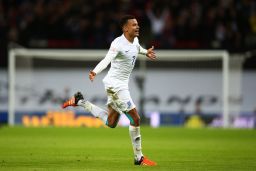Story highlights
Draw for Euro 2016 takes place on Saturday
Host nation France one of 24 teams in tournament
Owen Hargreaves says less star players key to success
Former England man believes team ethic overrides individual brilliance
Fewer stars, more team players – that’s the way to win one of the world’s biggest football tournaments, according to Owen Hargreaves.
Ahead of Saturday’s draw for the 2016 European Championship in Paris, former England international Hargreaves believes many teams are missing a trick by not focusing more on togetherness rather than individual brilliance.
It’s a failing that Hargreaves reckons England have been guilty of in the past by trying to cram too many star names into the squad.
And he points to the Greece team which stunned the football world by winning the European Championship finals in 2004 to back up his argument.
Without any household names, Greece was not expected to achieve anything of note in Portugal but ended up defeating the host nation in the final.
“You think about Greece winning Euro 2004. How many of those players were star players?” Hargreaves, who enjoyed a successful career with Bayern Munich and Manchester United, told CNN.
“Not really any of them, but for whatever reason, they were an incredible team. They blended together and beat the host nation, Portugal, in the final.”

Hargreaves was part of the England team which reached the quarterfinals at the 2004 tournament where it was beaten on penalties by Portugal.
He remembers the febrile atmosphere that accompanied the England team — as it so often does at major tournaments.
“We had the star players but we probably didn’t have enough time to be together, to train together, to make a team of it.
“There was so much expectation, so much pressure, that I think sometimes we could have done with one or two less so-called ‘star’ players and maybe a few more that did a role for the team like Greece did in 2004.”
England’s so-called ‘golden generation” was blessed with talent but failed to deliver when it really mattered.
The likes of David Beckham, Frank Lampard, Steven Gerrard, Michael Owen, Wayne Rooney and Paul Scholes were all involved in the squad which played in that tournament – all stars in their own right for some of the biggest clubs in the world.
“It was interesting to have all these star players from all the individual teams that were so competitive in the Premier League to come together and find a way to blend it all together and make great individual talents a team,” said Hargreaves.
“With England, for whatever reason, we were never able to find that balance. We had great talent but being a great team is something different.
“I think 2004 was our best generation – it was literally an all-star cast of world class players in probably every position.
“For whatever reason, we struggled to find a blend of all those individual talents and make a team of it.
England, which has never won the European Championship finals, will be one of 24 teams in Saturday’s draw for the tournament which begins on June 10. Hosts France have twice won the Euros – in 1984 when they also staged the competition and then in 2000.
Roy Hodgson’s current generation are not expected to challenge for the title, despite winning all 10 of its games in qualification, with a recent friendly defeat by Spain highlighting the gulf in class England face when they play the top international teams.
But this England team does have its positives with a number of young players set to make their mark.
Dele Alli, the Tottenham midfielder, is one of the most exciting players to have emerged in recent years, while his teammate Harry Kane, is growing into one of Europe’s most talented strikers.
Then there’s Raheem Sterling, the man who Manchester City paid Liverpool a reported $76 million for, who is beginning to showcase his talent in the Champions League.
Ross Barkley, the Everton playmaker, has impressed in the Premier League, while John Stones, the central defender, is considered one of the most outstanding prospects in English football.
And after failing to make it through the group stage at the 2014 World Cup in Brazil, there is little expectation of England success next summer in France – though that could work to the team’s advantage, according to Hargreaves.

“I think with this England team the expectation is far less,” he said.
“It’s a relatively young team with some great young players and I think that will work in England’s favor.
“I don’t think England are heavy favorites so I think they should trust some of the younger players because I think sometimes they have a hunger and desire to showcase that talent.”
It’s often said experience counts for everything in international football, but Hargreaves says being young often means you have fewer nerves.
“I remember when I first came onto the scene, probably some of the best games I played was when I was 20 years old because I had a fearlessness and point to prove to everybody.
“Nobody knew who you were – you were kind of under the radar. I think that England, potentially, with some of these younger players, might be able to do that.”







